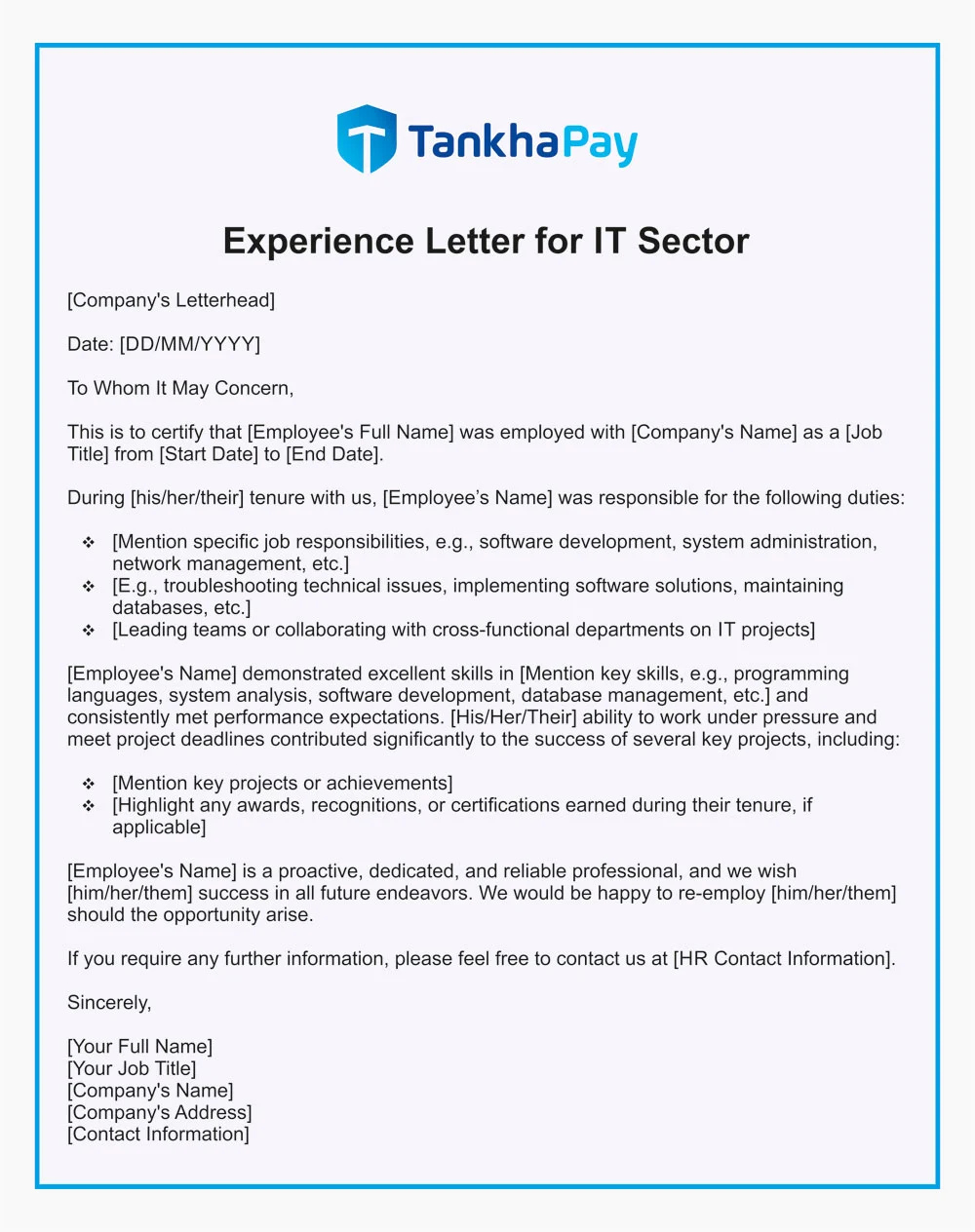Experience Letter Format: Legal Considerations & Compliance Checklist

Understanding the Legal Requirements of an Experience Letter
An Experience Letter is an official letter written and signed by an employer, which authenticates the duration of stay, job designation, and position of the employee within the company. Though it appears like a basic paper, it is very much laced with laws and must conform to labor acts and compliance legislation. A quality Experience Letter Format ensures accuracy, fairness, and security for employees and employers alike.
In this guide, we’ll cover the legal considerations, compliance requirements, and best practices for drafting an Experience Certificate that aligns with legal standards.
Experience Letter Format: What Employers Must Include to Stay Compliant
For an Experience Letter to be legally valid, it must contain the following essential elements:
Company Details:
Name of the organization
Company address
Official company letterhead
Employee Information:
Full name of the employee
Designation or job title
Employment tenure (start date – end date)
Job Responsibilities & Deliverables:
Summary description of responsibilities and assignments
Significant deliverables or contributions (if any)
Formal Declaration & Good Conduct Certificate:
General notice of employee performance
In case of urgency, a certificate of professional conduct
Signature & Validation:
Signature of an authorized signer (HR Manager, Director, etc.)
Seal of the authorized company (wherever required by labor law)
A Law-Compliant Experience Letter Document in Word should follow the above guidelines to avoid litigation.
Legal Do's & Don'ts of an Experience Letter – Employer's Guide
Do's:
✔ Provide proper employment details. ✔ Adopt objective, formal language. ✔ Sign the letter on the company letterhead. ✔ Remain confidential (don't provide sensitive details like salary). ✔ Remain in terms of employment contract.
Don'ts
✘ Present false or wrong facts. ✘ Give poor performance appraisal (can invoke legal proceedings). ✘ Refuse to give an Experience Letter for a reasonable cause. ✘ Use discriminative wordings. ✘ Present personal or confidential information without authorization.
The employers are required to maintain a record and retain copy duplicates of the Experience Certificates issued for intent to act and subsequent action.
Can An Employer Refuse to Issuance an Experience Letter? Legal Insights

Employer Responsibility:
-
Labor laws in most nations make it mandatory for employers to issue an Experience Letter on request of an employee.
-
In case the employee has successfully completed the contractual term, denial of issuing an Experience Certificate can be challenged legally.
Grounds Sufficient Enough for Refusal:
-
Unless the employee does not complete the minimum duration of service as prescribed in the company policy.
-
If there is a pending case or disciplinary proceeding against the employee.
-
If employee has breached terms of contractual guarantees (e.g., terms of NDA).
What Employees Can Do
-
Draft a proper letter to HR seeking it.
-
If refused, appeal to labour tribunals (if permitted in their country).
-
Seek an attorney if employer refuses the rationale for just cause.
Data Privacy & Confidentiality in Experience Letters – What You Need to Know
Companies have an obligation to adhere to data protection rules when issuing Experience Certificates. Priorities among the areas of compliance are:
-
GDPR & Data Protection Guidelines: Do not disclose employee personal information without approval.
-
Minimum Disclosure: Restrict the letter to facts of employment only.
-
No Salary Disclosure: Salary information should not be disclosed in an Experience Letter.
-
Request for Verification: Employers are required to confirm Experience Letters as per request but need not disclose other information.
Experience Letter vs. Relieving Letter – Legal Differences & Compliance
Request for both letters is recommended while applying for jobs in the future.
Legal Implications of Forgery or Misleading Experience Letters
Fraudulent experience letters are practiced by some employers and organizations, and they have serious legal implications:
For Employees:
-
Cancellation of job on detection with a forged Experience Certificate.
-
Prosecution under fraud and misrepresentation laws.
-
Blacklisting in the industry, affecting future work prospects.
For Employers:
-
Legal liability for issuing fraudulent experience letters.
-
Company reputation loss resulting from involvement in unethical practices.
-
Penalties or fines for failure to audit.
The employers are required to use strict verification procedures to detect false Experience Certificates.
Experience Letter Laws for Multi-National Corporations – Adherence Across Frontiers
Experience Letters have varying legal requirements among various nations. Some of the key considerations:
United States:
-
No legal mandate for employers to issue Experience Letters.
-
Reference checks are used by employees for verification.
United Kingdom:
-
Experience Letters are optional but reference letters are more common.
-
Employers must be truthful, as untruthfulness would invite legal actions.
India:
-
Employees can insist upon an Experience Certificate as per labor legislation.
-
Non-conformity would result in grievance to labor authorities.
UAE & Middle East:
-
Experience Letters are released commonly and most commonly used for visa issues.
-
Must comply with labor law standards and have official stamps.
Can an Experience Letter be used in Legal Disputes? Complete Guide
An Experience Letter can be used as evidence in legal conflicts like:
-
Employment Cases – To verify earlier work experience.
-
Visa Applications – Required for immigration and employment visas.
-
Salary Claims – If employee raises claims of unpaid dues on the basis of tenure.
-
Background Verification – Experience Letters are used by businesses for verification.
A legally valid Experience Certificate may prove to be a clincher in an employee's case during court hearings.
Experience Letter Compliance Checklist for HR & Employers
Ensure that every Experience Letter has: ✔ Letterhead of company & contact details ✔ Employee's name & title ✔ Tenure of employment & responsibilities ✔ Sanction & sign-off from officials ✔ Formal, objective tone
Prevent legal traps by:
✘ Not leaving out fictitious or inaccurate information
✘ Failure to disclose confidential employee details
✘ Failure to refuse a letter without sufficient reason
Conclusion
A legally sound Experience Letter Format protects employers and employees. With compliance with data privacy laws, employment acts, and ethical norms, companies can enjoy a hassle-free and controversy-free process. Employees should always request their Experience Certificate and make it legal-compliant.
Employers and HR professionals can gain from having an acceptable compliance checklist in order to avoid legal concerns as they provide transparency in employee turnover.
- Art
- Causes
- Crafts
- Dance
- Drinks
- Film
- Fitness
- Food
- Games
- Gardening
- Health
- Home
- Literature
- Music
- Networking
- Other
- Party
- Religion
- Shopping
- Sports
- Theater
- Wellness


